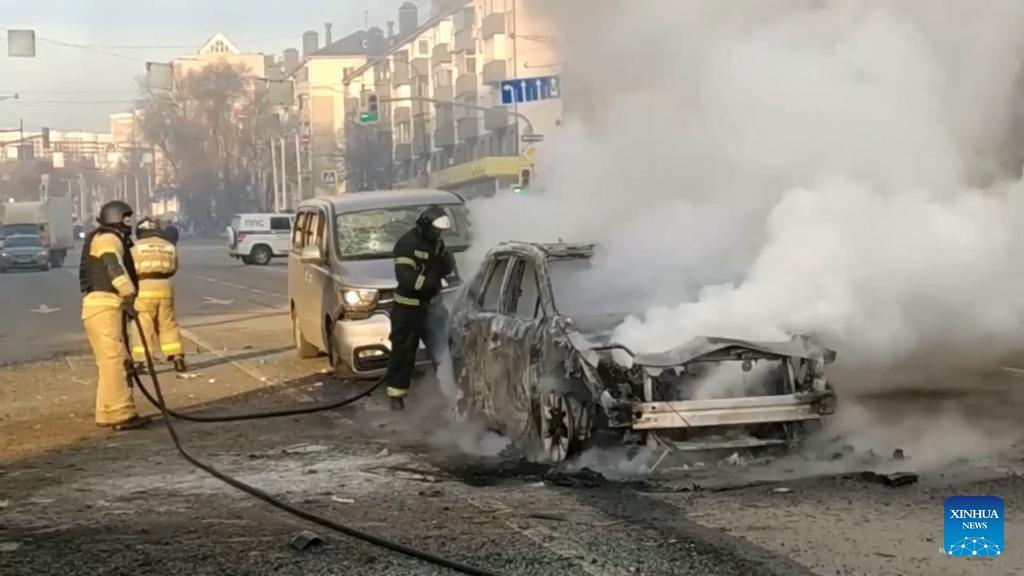 This screen capture from a video released by Russian Ministry of Emergency Situations on Dec 30, 2023 shows rescuers working at the site of Ukrainian shelling attacks in Russian border city of Belgorod. (PHOTO / XINHUA)
This screen capture from a video released by Russian Ministry of Emergency Situations on Dec 30, 2023 shows rescuers working at the site of Ukrainian shelling attacks in Russian border city of Belgorod. (PHOTO / XINHUA)
Despite many countries calling for Russia and Ukraine to resolve their sovereign and security disputes through peaceful talks, the two sides are still locked in a conflict. Both Russia and Ukraine have deployed heavy weapons against each other. But the Ukrainian army risks suffering heavy casualties for lack of proper air force protection. As for Russia, it has long abandoned its over-ambitious plan to take over Kyiv, so it is relatively easier for it to defend the areas under its control.
Also, this is perhaps the first time that both sides engaged in a conflict have been using artificial intelligence (AI) in military operations. For example, any detection of concentration of manpower or mechanized force by AI could instantly invite fire from the enemy.
This is also a conflict between two former republics of the Union of Soviet Socialist Republics — Russia as its only legal but much weakened successor, and Ukraine boosted by the support of the US and its allies.
What could decide the fate of the conflict is the US' domestic politics in 2024. Although the US lacks the resources to continually replenish Ukraine's arsenal, it has continued to support Ukraine with weapons and funds. The Republicans, given their majority in Congress, could hijack the agenda and upset Democratic President Joe Biden's strategy of supporting Ukraine, but they have not done anything of that sort so far.
The US' European allies, on the other hand, are working hard to assure Ukraine that it would be included in the European Union, even if it means forcing opponents like Hungary to agree to this idea. And once Ukraine joins the EU, its passage to NATO will become easier.
Perhaps the major European members of NATO are also preparing to take over NATO's reins from Biden if he cannot work out the next phase of US military aid to Ukraine. Therefore, 2024 could see deepening global divide. In the US, bipartisan politics seem to have intensified with the upcoming presidential election. In fact, there is infighting even within the Republican Party. This will deal a direct blow to the transatlantic alliance, further demoralizing Ukraine's leaders and people.
In contrast, Russia is likely to continue the "special military operation" in Ukraine to rid that country of "fascists".
The US-led NATO's expansion, in the name of boosting defense for all its members, obviously enhances its defensive capability, and its purpose may actually be to deter potential aggressors. But as per standard definition of threat, it is made up of threat capability and intent, and NATO's expansion, even in case it is mistakenly used for offence, could be an enhanced source of threat.
NATO's endless expansion to minimize any potential threat from Russia has forced Russia to assume that its future security might depend on the benignity of an expanded NATO, which is unacceptable to a nuclear superpower.
Russia and Ukraine can resolve their conflict only if they start to find a desirable but non-military way of safeguarding national security. For Russia, to keep Ukraine away from NATO, it has to resolve the crisis through talks as early as possible. For Ukraine, joining a multilateral defense alliance should make sure such a move is not misjudged or poses a threat to another country and does not bring harm on it.
Unfortunately, Russia is unlikely to stop its military actions to such an extent in the short term, and Ukraine and its military backers are not expected to regret what they have done. As such, 2024 is likely to be another gloomy year without major conflicts being settled.
The author is professor emeritus at and former executive dean of the Institute of International Studies, Fudan University.
The views do not necessarily reflect those of China Daily.


